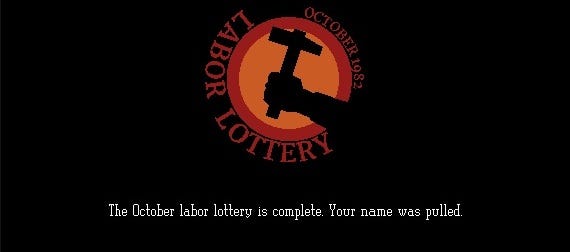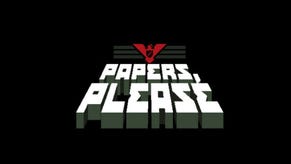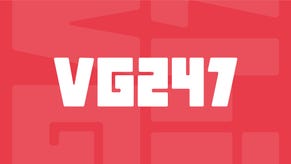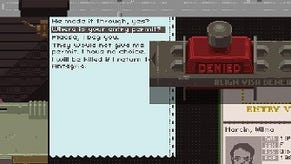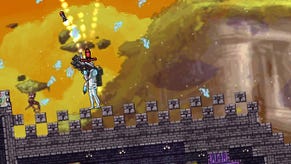Lucas Pope: "I'm kind of sick to death of Papers, Please"
Lucas Pope discusses his career, from Quake mods to Naughty Dog, the success of Papers, Please and why there won’t be a sequel.
Three-and-a-half years ago I somehow lost my passport in Cologne. You may laugh at this - and looking back, I occasionally chuckle about it - but at the time as a 19-year old, it was very scary.
"You're a real person, but from their perspective it's just like an anomaly that they're worried about. They can't verify your identity or they're being really extra careful."
The panic sank in as I realised it was missing. I had to let my family and boss know the situation. I called the Irish embassy and followed up with the German consulate to get papers sorted for a flight back to Dublin.
Then there was the hour-long train from Cologne to Frankfurt the next day which had me in tears. Sitting in Frankfurt Main airport (and having to run it end-to-end at one point), stressing out as to whether I'll get the papers in time for the flight, and how I nearly didn't get past security thanks being given photocopied papers, not the genuine article, by Aer Lingus.
The first few times I played Papers, Please, it reminded me of those 24 hours in Germany that have left me scarred. It was one of those experiences similar to my own that helped inspire the game's creator, Lucas Pope, to develop the game.
"That's one of the things I like about the game,” Pope tells me. “When you look at it from the other side, at least for me, I have a whole new level of understanding for the position that the authorities at the German airport, at least in your case, were in."
"They see a thousand of you a day. You're a real person, but from their perspective it's just like an anomaly that they're worried about. They're scared you're going to do something wrong, they can't verify your identity or they're being really extra careful.
"This was one of the things I tried to capture in the game, this kind of ambiguity and this vagueness to everything, not knowing for sure what anybody is saying is true and not knowing who to trust."
But there’s been no uncertainty regarding how Papers, Please has fared since release. It was one of 2013's biggest indie success stories.
The Apple Bug
I'm speaking to Pope on a very early Sunday morning through Skype to compensate his nine-hour time difference in Japan on a Sunday evening. He lives in Tokyo with his wife, a programmer he met at a games company they were both working at, after he moved from the States four years ago.
Whilst growing up in the US state of Virginia Pope got the bite for games. A NES was an essential part of gaming at the time, but it was a Mac Plus that Pope’s parents bought him that sparked his interest in programming.
"It has this packed-in application called Hypercard, which was basically a way you could script tiny interactive pieces of software," he says. "And it was a programmer language, it wasn't visual scripting, you had to write code.
"But you could write sprites and move them around and you could have buttons and interactions and things like that. That was where I first started realising how much cool stuff you could do with software."
After "tooling around" on his own and making C64 games with friends, Pope helped make a commercial mod for Quake (a game that “rocked my world”), which was sold to a publisher and made it to retail. Pope and the core group that made the mod would later go on to start Ratloop in the late nineties.
"There was no indie scene back then. You had to produce all this crap before you made any money and that means you needed a publisher."
"There was no indie scene back then," he says. "GDC was just starting and it's hard to actually realise how different it was back then making games, because you couldn't just make a game and sell it to people.
"You had to invest hundreds of thousands of dollars in printing discs and putting them in boxes and shipping them to Walmart. You had to produce all this crap before you made any money and that means you needed a publisher.
"So you had to have a publisher and a distributor that takes care of those expenses, because we were a bunch of kids and we couldn't afford that kind of thing."
Activision was one of Ratloop’s publishing partners, putting out a couple of games through its budget label which sold "pretty well, but not well enough" to make a living at the studio. It didn't help that there was fierce competition from Eastern European developers who would work for half the amount Ratloop would do it for.
After a stint at RealTime Associates, Pope moved to Santa Monica, and with some luck was hired as a programmer at what is now Sony’s flagship studio, Naughty Dog.
"I didn't have the resume for that kind of job, but Naughty Dog has a policy of taking a chance on people sometimes," says Pope.
"The key for me at Naughty Dog was I liked tools programming, I like visual tools, I like user interface kind of stuff and no-one likes that. Literally, in the games industry, it's really hard to find people who like writing tools, so that was kind of my advantage.
"At Naughty Dog I learnt how you remove things, how you sacrifice a lot of work that's already done in order to make a better game."
"You can kind of see that in Papers, Please, which is a very UI heavy game. It's clunky intentionally, but it's very much about the user interfaces interaction and that's where my interest lies."
Pope's introduction to the studio was a trial by fire, getting thrown into development of Uncharted: Drake's Fortune about halfway through. But it provided "an interesting experience" that he took a lot from despite being on the project for around eight months, creating UI tools the team didn't have at the time.
It was on Uncharted 2 that Pope learned what made a game really sing through valuable advice from one of the development team's main leads, game director Bruce Straley, who, with Neil Druckmann, would go on to form the development team that built The Last of Us after work on UC2 wrapped.
"From him, I learnt how you focus on what makes your game good, how you make it awesome and also how you cut away stuff, how you remove things, how you sacrifice a lot of work that's already done in order to make a better game."
With the team "firing on all cylinders", Uncharted 2 released to massive acclaim and was Naughty Dog's finest hour at the time, running away with numerous game of the year awards in 2009.
But towards the end of the game's development, Pope decided it would be his final project at the studio, having done a collaboration in his spare time with his wife on a PC game called Mightier. Uncharted 3 would follow, but by that point there was no motivation to work on the project from Pope.
"After Uncharted 2, which I thought was an awesome game, I couldn't see a lot of potential for new, cool ideas in the franchise."
"Working on Uncharted at Naughty Dog was great, but for me, I could see the next game was going to be Uncharted 3 and I had ideas about small games I wanted to make,” says Pope. “So I was sort of not looking forward to working on Uncharted because they're great games but they follow a definite formula. And after Uncharted 2, which I thought was an awesome game, I couldn't see a lot of potential for new, cool ideas in the franchise, I guess.
"[Naughty Dog co-presidents] Christophe [Balestra] and Evan [Wells] are really smart guys and really nice guys too and we're still friends and there was never any animosity, I just told them, 'I think I'll be leaving after this project' and that's it. They didn't want me to leave, but nobody was really that surprised."
Pre-approved
After leaving Naughty Dog and the move to Japan, Pope went on to make a few smaller games, but Papers, Please - released last August - was his first commercially available game through Steam Greenlight, which by his own admission passed through the controversial fan-voted process rather quickly than most other games.
"Greenlight was weird for me particularly because it was so easy. And especially at a time where developers were having a hard time with it, I more or less sailed right through. It's hard to talk about it because, and it sounds like I'm bragging, it was easy. And I don't have any complaints."
Pope says Papers, Please got "super lucky" in getting through Greenlight, and he credits YouTube Let's Plays as one of the main reasons.
"That's more or less what pushed me through Greenlight. Somebody like Nerdcubed noticed it on Greenlight and played it through his YouTube channel and suddenly, there's all these votes on Greenlight to vote it up.
"So it did end up being a popularity contest but I guess I got lucky with that because it got picked up by a lot of YouTube players."
Papers, Please may have been Pope's first commercial title as an indie, but it wasn't the first time its fictional setting of Arstozka was used. As a warmup to Ludum Dare 23 in 2012, Pope made The Republia Times, a flash game which saw you as the editor-in-chief of the main national newspaper of Republia, a country in a war with Arstozka.
"This dystopian, fascist setting works nicely for game mechanics because you can tell the player, 'you have to do this. You have to do it because that's how we f**king run things here, we tell you how to do it and you do it'."
"There was never an idea for the universe. The gameplay concept for The Republia Times is something that I had talked about with my wife a little bit, like 'I want to make a game that's just text that has to deal with propaganda'. We never got around to doing that but I just figured, 'alright, Ludum Dare is coming up, let me just try a warmup for that, get some tools setup, get flash going and try to program some stuff because I never programmed in flash before.
"And that's kind of when that game concept felt fully formed. It just has two countries in it, which are just two typical battling countries with names that both sound similar and are typical double-speak kind of names.
"What I found making this game is that this communist setting or this dystopian, fascist setting works nicely for game mechanics because you can tell the player, 'you have to do this'. There's not a whole lot of questioning of, ‘why?'. ‘You have to do it because that's how we f**king run things here, we tell you how to do it and you do it'. That works perfectly well with the setting of some kind of communist government or some kind of bureaucracy where the rules just come down from the top and boom, that's your job.
"And that played into Papers, Please perfectly because I had the core mechanics of moving papers around and comparing information, but I didn't have any setting and from the beginning, there was no idea that this was going to be in the same universe…"
For the all the Soviet and communist vibes it gives off, Pope says Papers, Please's inspiration was more based on "a collection of tropes" and trying to add a little variety around the surrounding countries so it wasn't solely Eastern European.
"At the same time," Pope says, "I worked pretty hard to make it so it wasn't specifically anything. Anytime there'd be something that would nail it down as Soviet or 'this is definitely the Berlin Wall', I would leave it out, wouldn't do it or smooth it over.
"Papers, Please never ever uses the word 'comrade'. If you use the word comrade, it's obviously Soviet Russian people talking. That would have hurt it."
"One good example of that is that the game never ever uses the word 'comrade'. When I hired people to localise the game, I gave them specific instructions not to use the word 'comrade' or its translated equivalent. That's because, to me, it's richer that it's not specifically anything. If you use the word comrade, it's obviously Soviet Russian people talking. And to me, that would have hurt it a bit."
An interesting sub-plot in the game is the moral dilemmas the player faces throughout. The immigration official has to look after his family and at the end of each day, you're given your pay which is divided between food, heat and rent – and if a family member falls sick, medicine too - that forces you to choose which options, rent aside, you have to pick sparingly.
At the same time, to name one example, there are spouses who are pleading with you at the gate to let them join their partners on their way in to Arstzoka despite not having the relevant papers. You'll get grateful thanks, but at the risk receiving a dreaded pink sheet and your pay docked.
"It kind of started with the idea that the game has to progress, the mechanics themselves have to progress. So as you play the game, new stuff comes in that you have to do in the core gameplay. The best way to introduce those things is to have some kind of story element to explain to the player why you have to search people with a scanner, you can't just dump a scanner in there.
"I wanted to show that in politics, all sides of any kind of issue have some justification. There's not just the good guys and the bad guys - even the bad guys have some justification for why they want to do something. I felt like that kind of setup would work well in the game where I could explain to the player why things are happening and get them onboard a little bit with some of the less nice things that go on to help them understand that running a checkpoint is hard."
In Lucas Pope, We Trust
Just over six months since its release on Steam Greenlight, and Papers, Please has been a triumph despite its unusual gameplay mechanics which initially sound tedious.
"That's kind of what I like - to get surprised by an idea. The fact it sounded boring was a challenge to make it interesting, to go against what people were expecting. In the beginning, I thought that would actually hurt the game a lot to be so hard to describe.
"It worked out pretty well because it piques people's curiosity enough to wonder, 'how could you make something like that interesting' or 'how could you make it fun' and it's enough to get people to try it and hopefully enjoy it."
"I've already worked on it for a year and four months, so it's already to me like, I'm kind of sick to death of Papers, Please."
So what comes next for Lucas Pope and Papers, Please? Pope's just put out Linux support and localisations of the game as well as sorting out support issues, and is now set to take a small break before creating a short and quick free game.
After taking some time away, he'll be returning to the game to do an iPad version, perhaps releasing this year. And as previously mentioned, he's keen on a Vita version (in the wake of that story going live, Pope has since said on Twitter he'd like to also see a Wii U version).
But is there more in Papers, Please future?
"At this point, no.
"Leaving Naughty Dog was like, 'I want to work on small experimental games'. I've already worked on it for a year and four months, so it's already to me like I'm kind of sick to death of Papers, Please. My plan is to make a quick, short, free game. And then once I've gotten a little distance from Papers, Please, come back to it and do the iPad port, but I don't have any plans for a sequel or DLC or anything like that, at least not right now."
"There's always a chance I could reuse some of the setting like I did with Papers, Please and Republia Times but the interesting part is the new concepts where I have a lot of challenge in trying to figure out what to do. If I was going to do a sequel or DLC, those challenges have been met and the problems have already been solved, so it's not that interesting to me anymore."
Whatever happens from here on out, Lucas Pope can hold his head up high. He gave us one of the most refreshing game ideas of 2013, turning the mundane into the compelling. On that evidence, whatever does come next will be just as unique.
One bit of advice: try not to lose your passport within that time.
Lucas Pope is creator of Papers, Please.
